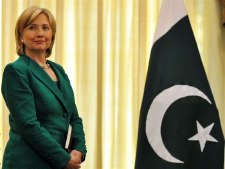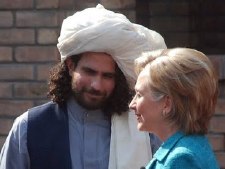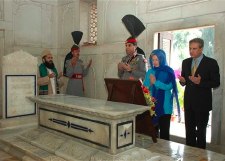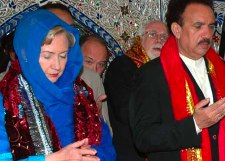I conducted an interview with Secretary of State Hillary Clinton in Washington, DC about Pakistan and the United States’ relations with the Muslim world, originally published on my blog Watandost.
Hassan Abbas: During your recent visit to Pakistan, you won the hearts of many through your courageous outreach — visiting Badshahi mosque, participating in television talk shows, interacting with students at country’s premier educational institution Government College Lahore, and most importantly going to the mausoleum of Mohammad Iqbal, the poet-philosopher who gave the idea of Pakistan. Even those who are critical of the U.S. policy were appreciative of these gestures and it served an important message to those Pakistani politicians also who are not in touch with masses.
What were the signs of hope that you gauged during this visit?
Secretary Clinton: Well, first, the resilience and the courage of the Pakistani people. Everywhere I went, I met people who are speaking out and standing up and working hard, and that was extremely moving to me. I also felt like both the civilian government and the military leadership understood that the threat they faced had to be addressed.
And I thought that was very promising, because the terrorist threat to Pakistanis growing and it’s intense and it can only be defeated by the Pakistani people coming together and rejecting it, in the first instance, trying to present a different narrative than the one that the terrorists are putting forth, using military force where they must, but mostly by developing the democratic institutions, by developing the country, clearly demonstrating that Pakistan has no room for those who want to tear down, because the Pakistan people want to build.
Hassan Abbas: During the said trip you also visited police offices in Islamabad to pay tribute to the sacrifices rendered by police officials in the fight against extremism. You are the first and so far the only foreign leader visiting Pakistan who thought of this. It is becoming clear in Pakistan that the country will not be able to win this battle especially in areas like Punjab and Karachi unless its law enforcement and police forces are reformed and upgraded. I must confess that this topic is of special interest to me as before my academic career in the U.S., I was a police official in Pakistan. Also Pakistan army cannot be expected to fight everywhere in the country. In this context, will the U.S. be supporting police and law enforcement reform agenda in Pakistan?
Secretary Clinton: Well, we would be honored to do so, because I agree with you that the police truly are on the front lines. They often have to deal with the rush of violence that comes in cities or towns and they don’t have the support they need, they don’t often have the equipment that they need. And as you say, I met a number of police officers, both in Lahore and in Islamabad, who are very committed, but under-resourced. And I am more than happy to consider any request from the Pakistani Government to help the police force, because I agree completely that they’re the front line of defense.
Hassan Abbas: Thank you very much. I am sure this would make a headline in Pakistan. I have been in touch with many of my former colleagues in the country and during my research on the subject, I found that Pakistan police is one of the very few organizations in the country where there is an internal institutional effort for reform. I hope your message of support in this sphere will be welcomed and appreciated in Pakistan.
My next question is about U.S. relations with the Muslim world. This U.S. administration has certainly set a new tone of dialogue, reconciliation and respect in this realm. President Obama’s speeches in Turkey and Cairo were absolutely great and gave the right message to the Muslim audiences around the world. What is the follow-up on that? What are the next stages of that relationship?
Secretary Clinton: Well, it’s a great question because we’ve been working very hard on follow-up, and I recently attended a conference in Marrakesh, Morocco where we announced a number of follow-up actions. The one that was just embraced wholeheartedly was the idea of science envoys. I said at the time that much of the science that we take for granted today was really discovered and refined in prior times by Islamic scholars and scientists. And from astronomy to algebra, there’s so much that we owe to the Muslim world, and there needs now to be a renewed emphasis on science, which is not incompatible with religion, and therefore, we’re going to be sending Nobel science prize winners, former heads of the National Academy of Sciences, and so many others to visit universities and governments to try to rekindle that with our help.
We’re also investing in more English language education programs. We’re investing in more business programs, entrepreneurship programs. We’re going to start a series of interfaith dialogues. There will be a lot of follow-up to Cairo because we have had such demand and we’re going to try to meet it.
Hassan Abbas: You are known for your cordial relationship with Pakistani diaspora in the U.S. There is a large Muslim diaspora in the U.S. which I believe can act as a bridge between the U.S. and the Muslim world. Which are the other Muslim diaspora groups in the U.S. that you feel encouraged about and which can play a positive role?
Secretary Clinton: That’s a great question. Well, I do believe that the Palestinian diaspora has been galvanized around economic development. A number of my Palestinian American friends are making investments in the West Bank because the security has improved so much, thanks to the good work of President Abbas and Prime Minister Fayyad. So there is a rather dramatic increase in the economic activity in the West Bank which many American Palestinians are investing in.
There are a number of Indian Muslims who are very involved in interfaith and other outreach activities. I do a lot of work with the Bangladeshi community, which is not as involved as the Pakistani community has been in academia or in professional activity, but is really at the grassroots in a lot of countries — or a lot of cities in our country. So I think those are some examples of what we’re working on.
Hassan Abbas: My last question is about India-Pakistan relations. The United States has said many times that it would like to facilitate better India-Pakistan relations and I think there’s no doubt about the sincerity of that purpose. But of course, U.S. has its limitations in terms of how much it can do to bring both parties on the table and perhaps India is not very comfortable with the idea of third party mediation because of its stature, and reasons of history. However, President Obama made an interesting statement on the subject during his recent visit to China. European Union also is interested in playing a role in this arena.
Do you think there might be some possibility in future that E.U., China, and United States altogether can take an initiative to bring Pakistan and India together and help them resolve their differences. We continuously hear that peace in the Af-Pak region is considered the most critical issue for the global security concerns. A global approach hence can be relevant. Do you think such an international effort can work?
Secretary Clinton: I think it could be a guarantor or it could be a positive force for implementation. But I think that the impetus must come from the two countries themselves. And at some point, both countries might say we’ve gotten as far as we can get; therefore we need some support, we need some new energy. But we have to start with the two countries and with their commitment to pursuing this dialogue first.
More commentary and thoughts on my blog Watandost.

























































Why must all interviews be antagonistic? Here we have a person, the US Secretary of State, reaching out and searching for solutions. A tough interview with her would have served nothing other than to pander to some misguided sense of vengeance. Hassan Abbas’ approach is much more naunced. He has asked tough questions in a thoughtful way, so as to actually get an answer rather than simply making “points”. There can be minor quibbles about some questions but an intelligent effort overall.
Comparing Hassan Abbass with Hussain Haqqani is totally unfair.
The conversation is very insightful and informative. Hillary Clinton clearly has a soft corner for Pakistan – and Hasan asked good and relevant questions (though he projected his own views as well). I must admit being a New Yorker, I am also a fan of Hillary.
The comments indicate also how Pakistanis and Pakistani-Americans differ in their perspectives.
Not impressive. I think all interviewers should be polite and decent, but that does not mean they have to be limp and self-serving and khushaamdi. No US anchor will ever ask such soft-ball questions. Poor Show.
Unusual interview in that it seems like the interviewer says much more than than the person being interviewed!
I am very skeptical about this idea of the police being the most important institution in preventing terrorist attacks. No one will disagree with the fact that the police officers have been at the front lines and have suffered a great deal. However, even the best equipped police officer cannot compete with a militant bent on destruction. Even in the U.S. there are areas in virtually every city where drugs and street violence are rampant and the police are well-aware, but simply cannot do anything about it.
Also, I especially don’t understand the relevance of questions about America and the Muslim world. What does this have to do with the current situation in Pakistan? Why are we still so adamant about injecting ourselves into Arab affairs, when we see the great damage it has caused us?